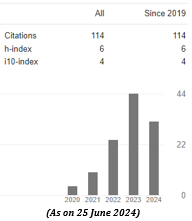AN EFFICIENT IMAGE WATERMARKING SYSTEM BASED ON ERROR CORRECTING CODES IN DCT DOMAIN
Abstract
Digital watermarking has drawn extensive attention for copyright protection of multimedia data. This paper proposes a new
watermarking system for digital images using efficient systematic linear block codes (SLBC) in discrete cosine transform (DCT)
domain. The proposed watermarking system using SLBC generates a code sequence of {0, 1} that provides error correction
capabilities and then replaces it with a binary watermark sequence of {-1, 1}. This achieves more robust invisible image
watermarks and requires a small storage unit for binary sequence numbers. The generated watermark sequence is then used as an
input for our proposed watermarking system which consists of watermark embedding process and watermark detection process.
Experimental results indicate that the invisible watermark embedded with the proposed system are very robust against various
kinds of attacks such as white Gaussian noise, JPEG compression, median, and mean filtering, by showing similarity values
ranging from 0.7 to 0.8.
Downloads
References
[2] I. Pitas, “A Method for Signature Casting on Digital Images,” in Proceedings of IEEE International Conference on Image Processing, Vol. 3, pp. 215-218, Sept. 1996.
[3] J. O’Ruanaidh, W. Dowling, and F. Boland, “Phase Watermarking of Digital Images,” in Proceedings of IEEE International Conference on Image Processing, Vol. 3, pp. 239-242, Sep. 1996.
[4] I. Cox, J. Killian, F. Leighton, and T. Shamoon, “Secure Spread Spectrum Watermarking for Multimedia Data,” IEEE Transactions on Image Processing, Vol. 6, No. 12, pp. 1673-1687, Dec. 1997.
[5] S. Craver, N. Memon, B. Yeo, and M. Yeung, “Resolving Rightful Ownerships with Invisible Watermarking Techniques: Limitations, Attacks, and
Implications,” IEEE Journal on Selected Areas in Communications, vol. 16, No. 4, pp. 573-586, May 1998.
[6] C. C. Wai, “DCT-Based Image Watermarking Using Subsampling,” IEEE Transaction on Multimedia, Vol. 5, No. 1, pp. 34-38, 2003.
[7] S. H. Yang, “Filter Evaluation for DWT-domain Image Watermarking,” Electronics Letters, Vol. 39, No. 11, pp. 840-841, November 2003.
[8] J. Huang and Y.Q. Shi, “Adaptive Image Watermarking Scheme Based on Visual Masking,” Electronics Letters, Vol. 34, No. 8, pp. 748-750, 1998.
[9] J. Delaigle, C. D. Vleeschouwer and B. Macq, “Psychovisual Approach to Digital Picture Watermarking” Journal of Electronic Imaging, Vol. 7, No. 3, pp. 628-640, 1998.
[10] B. Sklar, Digital Communications Fundamentals and Applications, Second Edition, Pearson Education, 2002
Though MIJST follows the open access policy, the journal holds the copyright of each published items.

This work is licensed under a Creative Commons Attribution-NonCommercial 4.0 International License.
















